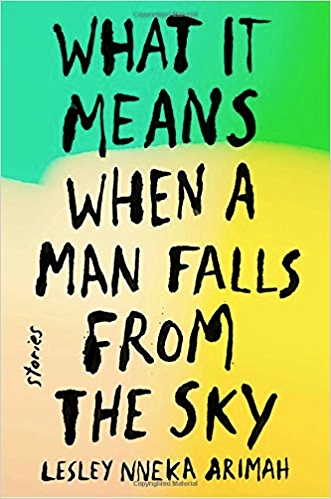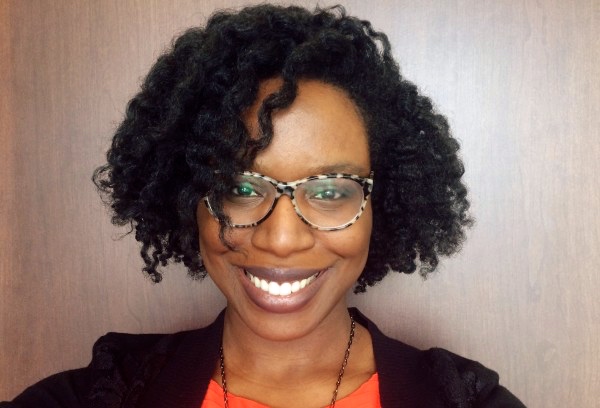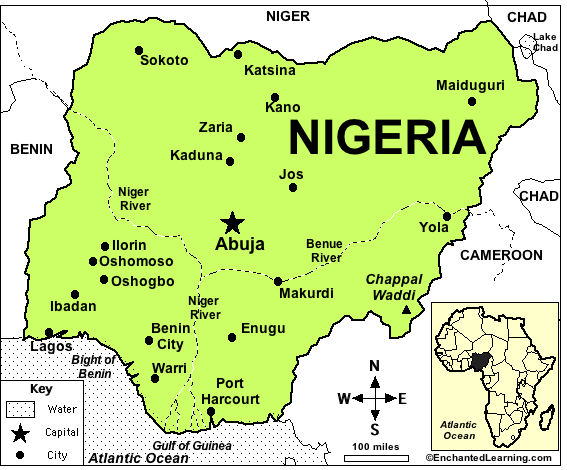Note: This novel was WINNER of the Kirkus Prize for 2017, a FINALIST for the National Book Critics Circle Award Leonard Prize, and named a Best Book of 2017 by NPR, The Guardian, and Publisher’s Weekly.
“[A] motion-activated device had caught the last fifty feet of the man’s fall, the windmill panic of flailing arms, the spread of his body on the ground. When the formula for flight had been revealed short months before, the ceremony had started unimpressively enough, with a man levitating like a monk for fifteen boring minutes before shooting into the air. The scientific community was agog. What did it mean that the human body could now defy…gravity? It had seemed like the start of a new era.”–from the title story
 With this startling, futuristic title story, debut author Lesley Nneka Arimah wakes up her reader and signifies that this is no “ordinary” collection. The stories in this book make so many creative leaps into new worlds that in many ways the author actually defies the limits of her genre. Born in the UK, Arimah grew up in Nigeria, following her father in his work abroad and acquiring such varied experiences of life that she has escaped the cultural limitations which so often root a writer’s work firmly in one place. The multicultural Arimah finds, appreciates, and focuses on the elements which make people from different places and times react differently to seemingly similar sets of circumstances, creating stories which are full of surprises and unexpected twists. Within these stories, however, she also recognizes the seemingly universal problems and habits which can often limit and determine a character’s personal outcomes. As she explores life from many points of view, her own vision, often dark, creates in the reader the urge to re-read, re-explore, and re-imagine both her work and the settings in which her characters live, to come to know them better and, perhaps, understand what makes many of her conclusions so surprising.
With this startling, futuristic title story, debut author Lesley Nneka Arimah wakes up her reader and signifies that this is no “ordinary” collection. The stories in this book make so many creative leaps into new worlds that in many ways the author actually defies the limits of her genre. Born in the UK, Arimah grew up in Nigeria, following her father in his work abroad and acquiring such varied experiences of life that she has escaped the cultural limitations which so often root a writer’s work firmly in one place. The multicultural Arimah finds, appreciates, and focuses on the elements which make people from different places and times react differently to seemingly similar sets of circumstances, creating stories which are full of surprises and unexpected twists. Within these stories, however, she also recognizes the seemingly universal problems and habits which can often limit and determine a character’s personal outcomes. As she explores life from many points of view, her own vision, often dark, creates in the reader the urge to re-read, re-explore, and re-imagine both her work and the settings in which her characters live, to come to know them better and, perhaps, understand what makes many of her conclusions so surprising.
 In this post-apocalyptic title story, Nneoma, her African main character, is one of fifty-seven registered Mathematicians who specialize in calculating grief for the Biafra-Britannia Alliance, where she lives. Threatened with floods which had been swallowing the British Isles, the UK had formed an alliance with Biafra, a break-away section of Nigeria which the British eventually dominated, just as the French did with Senegal and the US did with Mexico. When a Chilean mathematician discovers a formula which appears to explain the entire universe, hopes rise in the slowly dissolving world. Subsequent mathematical equations offer control of human anatomy and emotions, and it soon becomes possible for a knowledgeable Mathematician to remove grief from someone else who needs help. The fall of the man from the sky, however, is an ominous sign that something may be wrong with the formula. In a fashion which becomes typical for her, Arimah takes this broad story about the universe, and the need to control universal human emotions, and distills it, boiling its essence down to the level in which one or two main characters develop the story on a personal level and become responsible for the conclusion.
In this post-apocalyptic title story, Nneoma, her African main character, is one of fifty-seven registered Mathematicians who specialize in calculating grief for the Biafra-Britannia Alliance, where she lives. Threatened with floods which had been swallowing the British Isles, the UK had formed an alliance with Biafra, a break-away section of Nigeria which the British eventually dominated, just as the French did with Senegal and the US did with Mexico. When a Chilean mathematician discovers a formula which appears to explain the entire universe, hopes rise in the slowly dissolving world. Subsequent mathematical equations offer control of human anatomy and emotions, and it soon becomes possible for a knowledgeable Mathematician to remove grief from someone else who needs help. The fall of the man from the sky, however, is an ominous sign that something may be wrong with the formula. In a fashion which becomes typical for her, Arimah takes this broad story about the universe, and the need to control universal human emotions, and distills it, boiling its essence down to the level in which one or two main characters develop the story on a personal level and become responsible for the conclusion.
While this story deals with broad universal topics, including climate change, the difficulties of governing a country in a problematic world, and universal mathematical goals and principles, many of her other stories stress family conflicts, especially between generations. “Wild” typifies some late teen issues. The speaker, living in the US and about to go off to Emory University, has an argument with her Nigerian mother about the bad influence of one of the girl’s friends. Her mother takes action, packing the girl’s bags, securing her passport, and buying her a ticket to Lagos to visit her aunt and cousin for the summer. The plane will leave in four hours, and she will be allowed a return ticket if she behaves while there. In Lagos, she discovers that her cousin, whom she had regarded as too-good-to-be-real, turns out to be very different from what she’d expected, and her aunt is having similar, but in some ways worse problems with her daughter than her own mother had had with Ada. In the less complex but well developed “Second Chances” a mother returns from the “dead” and creates havoc in the lives of two daughters and her husband.
“Who Will Greet You at Home” gets inside the mind of a desperate woman who works in a hair salon and longs to have a child. She becomes so desperate that she creates a doll out of human hair and treats it as real, planning to offer it to a sorceress in the hope that her desire to have a child will be fulfilled. In “Light” a father, devoted to his daughter, is her sole parent during the years his wife is in the US studying for her Master’s degree. Telling the story as a flashback from the first paragraph, the author develops the father-daughter relationship, then informs us that the wife has just been offered a job in the US. She now wants their daughter to come live with her, leaving him desolate. The conclusion to this story, which has been told in flashback, returns to the opening paragraph. The saddest and most dramatic story is “Buchi’s Girls” in which a widow with two young children is living with her more fortunate sister and her husband who treat them worse than servants. Developing the story slowly through dialogue and plainly presented details, Arima makes the full horror of Buchi’s situation come to life.

From 1967 – 1970, the Igbo people of Nigeria rebelled under this flag in an effort to establish the independent country of Biafra in the south of Nigeria, from Port Harcourt and to the northeast.
Arimah writes with complete control of her material and makes it seem effortless, even casual in approach, perhaps a function of the domestic themes and the many characters dealing with common family problems, however exotic some of the complications might be. Her choice of details, some real and some fantastic, keeps the reader’s imagination thoroughly engaged, either through description or the strategic absence of it as the author develops suspense. Her ability to convey information though dialogue, and to give and withhold clues regarding the past keeps the reader’s interest high as she uses a variety of subgenres – futuristic, fantastic, realistic, dramatic, and even sentimental – to manipulate and expand her range. This is an author with immense talents which take advantage of her wide knowledge of different cultures and the common themes and issues shared by all. A novel by Lesley Nneka Arimah would allow her even more leeway to expand on her ideas and style. I hope it comes soon.
Photos: The author’s photo appears on : http://brittlepaper.com
The congestion in Lagos is shown here: https://smartercitieschallenge.files.wordpress.com
The map of Nigeria is found on http://www.enchantedlearning.com/
The flag of Biafra, now considered a flag of the Igbo people, is seen here: https://en.wikipedia.org/


